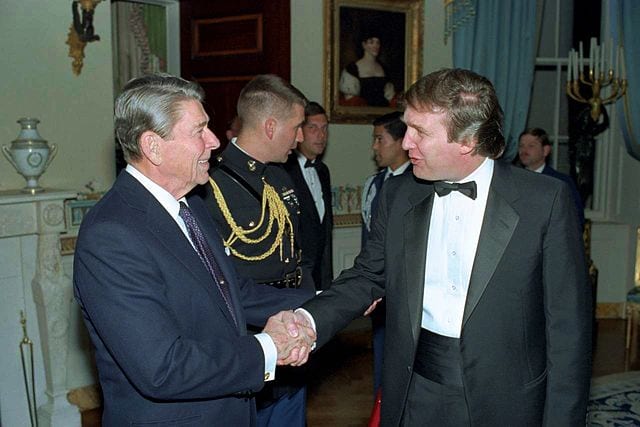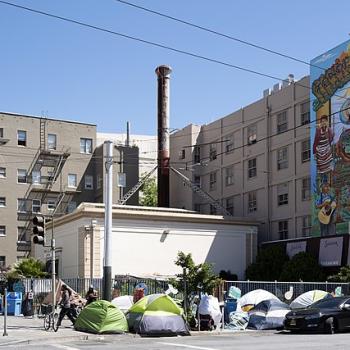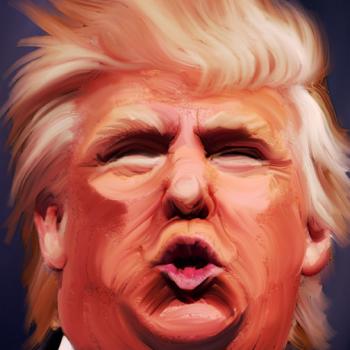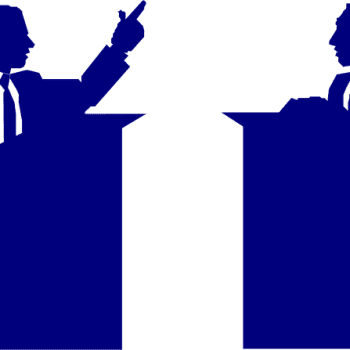
Progress, far from consisting in change, depends on retentiveness. When change is absolute there remains no being to improve and no direction is set for possible improvement: and when experience is not retained, as among savages, infancy is perpetual. Those who cannot remember the past are condemned to repeat it. (Philosopher George Santayana [1863-1952], The Life of Reason, 1906)
*****
“If the Reagan Pattern Continues, America May Face Nuclear War” (W. Averell Harriman, 1 January 1984, New York Times):
This is the grim result of Reagan Administration diplomacy: If present developments in nuclear arms and United States-Soviet relations are permitted to continue, we could face not the risk but the reality of nuclear war.
To be silent in this situation is not patriotic but irresponsible. In the last month, nuclear arms negotiations have collapsed. Communication of all kinds between the United States and the Soviet Union has broken down; instead, we have propaganda barrages and the spectacle of the leaders of the two mightiest nations on earth trading insults, as if they had no more serious obligations than their own personal pride and political survival. . . .
President Reagan and his Administration bear their own heavy measure of responsibility for the situation we face today. No President in the nuclear age, strengthened abroad as was Mr. Reagan by the consensus at home for a strong national defense, secure politically on the right and the left for the endeavor of arms control, had such an opportunity to reverse the nuclear arms race. Yet this opportunity has been squandered. . . .
To put it plainly, President Reagan must be ready and willing to negotiate; he must want progress even more than he wants to berate the Soviet Union.
I am convinced that we must engage ourselves now in this fundamental choice about our future – and that is why I write as the New Year begins. We must demand a new effort to prevent war, not to prepare for it.
“Ronald Reagan, Warmonger” (Murray N. Rothbard, Libertarian Forum, Vol. XVII, Nos. 7–8, July–August, 1983):
The drift toward war, and the ascendancy of the war-hawk troika, are ominous signposts for the future. The only silver lining in the cloud is that, despite the whipped-up hysteria, the Reagan Administration hasn’t really done anything to crack down directly on the Russians. (He couldn’t retaliate by banning Aeroflot in U.S., since Carter had already locked that into place when the Russians marched into Afghanistan.) His not doing anything concrete has, of course, sent conservatives up the wall, for this is by far their most emotional and most deeply felt of the three broad issues. It is a helluva note when we have to rely, for saving us from nuclear annihilation, on the likes of the Rockefellers, the Trilateralists, the Shultzes, the Kissingers, and all the rest. But that is unfortunately the way things are.
Hopefully, as rhetoric and reality clash and as we weave back and forth in the direction of the Final World War, Ronnie will be booted out in 1984, and we will all be able to leave the question of who or what is the “real” Reagan to shrinks and historians. Ronald Reagan will, then at long last, become supremely irrelevant for our time.
“The Left Was Easily Confused by Reagan, Too” (James Taranto, Wall Street Journal, 24 October 2012):
Back in the ’80s, they called Reagan a warmonger too–and nowhere more so than in elite universities such as those where a young Barack Obama was indoctrinated. History does not record the name of the person who noticed that you can rearrange the letters of “Ronald Wilson Reagan” to spell “insane Anglo warlord,” but that unknown anagramist provided that decade’s leftists with many a self-satisfied chuckle.
But what wars exactly did Ronald Reagan mong? The 1983 liberation of tiny Grenada was not exactly Normandy, and the 1986 bombing of Libya was small potatoes compared with last year’s French-led, Obama-followed intervention in that country that finally toppled Muammar Gadhafi.
Today Reagan is generally credited with having won the Cold War while firing nary a shot. But to the left at the time, his byword of “peace through strength” just didn’t compute.
“Reagan’s legacy at 100, from 3 very different perspectives” (Steven Thomma, McClatchey DC, 2 February 2011):
[Walter] Mondale’s first Reagan memory is of an upbeat rival whose optimism marked their clash of ideas as well as his politics.
“He is remembered as a very positive, hopeful public leader who helped fill that need at a tough time in American history, and I give him credit,” Mondale said. “In our campaigns, he never got mean, he never got bitter, he never got personal.”
A fierce opponent of Reagan’s arms buildup against the Soviet Union, Mondale said he still regretted that Reagan wouldn’t negotiate an arms treaty with the Soviets during his first term. Mondale said that Reagan relied too much on the thought that the Soviets couldn’t be trusted and the hope for a missile defense shield in space that would protect all Americans from any missile strike.
“After the campaign, and I pounded him on it, Nancy pressed him to try to find a negotiated agreement,” Mondale said. “He changed. I would give him credit for changing.”
Though many liberals portrayed Reagan as a warmonger at the time, Mondale credits him with restraint in the use of force, noting that he sent U.S. forces into battle rarely, including to the Caribbean island of Grenada and to Lebanon.
“His bark was bigger than his bite, which looks good now,” Mondale said. “He was actually pretty careful. …I would give him a fairly good grade.”
“Same liberal media called Reagan ‘warmonger’ and Trump ‘accommodationist’ on Russia” (Ed Straker, American Thinker, 16 July 2018):
Many of you remember the 1980s. Ronald Reagan became president in the wake of the Iran hostage crisis, the Soviet placement of nuclear missiles in Eastern Europe, and the Soviet invasion of Afghanistan.
Reagan’s response was to call the Soviet Union an “evil empire” and to begin a major buildup of our conventional and military forces, as well as placing medium-range nuclear missiles in Europe to drive Russia to the negotiating table.
And how did the liberal media respond? They called Reagan a “hardliner” and a “warmonger.” They urged him repeatedly to engage in détente with the Soviet Union.
Republican leaders blasted Reagan as a trigger-happy warmonger. Much as Trump now threatens to downsize NATO and start a trade war with China, so Reagan attacked Ford, the sitting Republican president he ran against in the 1976 primary, and Henry Kissinger for their pursuit of the bipartisan policies of détente and Chinese engagement. The sole benefit of détente, Reagan said, was to give America “the right to sell Pepsi-Cola in Siberia.” For good measure, he stoked an international dispute by vowing to upend a treaty ceding American control over the Panama Canal. “We bought it, we paid for it, it’s ours, and we’re going to keep it!” he bellowed with an America First truculence reminiscent of Trump’s calls for our allies to foot the bill for American military protection. Even his own party’s hawks, like William F. Buckley Jr. and his pal John Wayne, protested. Goldwater, of all people, inveighed against Reagan’s “gross factual errors” and warned he might “take rash action” and “needlessly lead this country into open military conflict.”
“How Reagan Became Reagan” (Steven F. Hayward, Claremont Review of Books, Fall 2004):
Churchill took seriously that Hitler meant what he had written in Mein Kampf, a book few Britons bothered to read and would not have taken seriously if they had. Likewise Reagan took seriously the resolve of Lenin and his successors, quoting often Lenin’s statement that “it is inconceivable that the Soviet Republic should continue to exist for a long period side by side with imperialistic states. Ultimately, one or the other must conquer.” Churchill warned that weakness (“appeasement”) would lead to war. He was attacked as a menace and a warmonger. Reagan held a similar view, warning as early as 1961 that “[t]here can only be one end to the war we are in. It won’t go away if we simply try to outwait it. Wars end in victory or defeat.” Even Cold Wars. Which is why Reagan said, before becoming president, that his idea of how the Cold War should end was simple: “We win, they lose.” And like Churchill in the 1930s, liberals in the 1980s thought Reagan was a warmonger.
Like Churchill, Reagan had a vivid imagination that was the source of much of the criticism that he confused fantasy with reality. But it was also the source of much of his strength. It was Reagan’s capacious imagination that led him to embrace missile defense, just as Churchill’s imagination led him to champion a variety of military innovations from the tank to radar.
“Trump and Reagan: Similarities and Differences” (Ambassador Faith Whittlesey, The Phyllis Schlafly Report, May 2016):
I knew Ronald Reagan when TV pundits in the U.S. and Europe presented him as a cold-hearted extremist who was longing to take away food and shelter from America’s poor and risk nuclear cataclysm. I was with him when the Rockefeller Republicans dismissed him as a former B-rated movie star and crackpot warmonger. Reagan’s supporters were smeared as rubes, nativists, and religious fanatics. Reagan was a man who bucked the GOP “wise men” over and over again, until he won.
“From Reagan’s mouth to Trump’s, Obama’s ears” (Carl M. Cannon, Orange County Register, 1-15-17):
So, not friendly questions, even if they were politely phrased. Guess how many times Reagan bristled, used the phrase “fake news,” called his opponents “sick people”? You guess it: none. This pattern held for eight years. Liberals with TDS (Trump Derangement Syndrome) may get all misty-eyed when they think of the 40th president today, but they had RDS (Reagan Derangement Syndrome) back then. For eight years, Democrats brayed about Reagan the warmonger, Reagan the cowboy, Reagan the racist, Reagan the idiot, Reagan the senile, Reagan the gay-hater. But here’s the point: Reagan didn’t respond in kind. He kept it classy right up through his Jan. 11, 1989 farewell address as president.
***
I wrote the following on 28 January 2017 on Facebook:
Reagan Was a Racist, Dunce, and Warmonger; So is Trump (Nothing New Under the Sun, in Tired Liberal Rhetoric and Smears)
It’s the same with every Republican President. I’ve observed this stuff since Reagan. Almost all of this was said about him. He was gonna start WW III; he was a dunce about nuclear warheads, and an imbecile about economics (Bush I, opposing him in the primaries famously called his view “voodoo economics”).
None of that happened, did it? He got us into no wars except the dinky little conflict in Grenada. He got a nuclear treaty signed with Gorbachev (and pretty much out-foxed him). The Berlin Wall fell, the Soviet Union came crashing down the year after he left office, and we all know what happened with the economy.
He was supposedly a racist (being a Republican). The black middle class grew by leaps and bounds during his two terms, whereas black income and home ownership decreased under Obama, and their unemployment went up. He’s been at war in Afghanistan his entire eight years, the Middle East is in shambles, as is health care insurance. Race relations are arguably worse than they have been since the 1950s.
Thus, the facts of success and achievement all favor Reagan over Obama. Obama did not a thing about the murders occurring daily in Chicago. Trump is already talking about taking action, in his first week.
Reagan was accused of virtually all of the same stuff. Liberals never learn! So now we hear these asinine comparisons of Trump’s policy with Kristallnacht, ludicrous charges that adviser Steve Bannon is a white supremacist, Trump’s not really pro-life (only faking it), his character is worse than any other President ever (Bill Clinton? JFK? Nixon?), and on and on.
I shake my head, poker-faced, yawn at length and say, “same old same old . . . ” It’s always good to remember past history. At age 58, there is a lot of history I can remember, and it gives one perspective and knowledge.
Democrats do nothing if not trot out the same myths and whoppers every four years. It’s what they do. They have lied so long they think they are actually telling the truth. It *feels* like truth to them, and as we know from long experience putting up with their follies, liberalism is all about feelings; not much about reason.
One difference this year is that much of the criticism comes from third-party folks and GOP establishment types. But almost all of the arguments come from the good ol’ Democratic playbook of talking points. It’s all the same stuff. And we call that being a “useful idiot” for secularist liberalism: a known term in political science, which means being an unwitting dupe.
***
Related Reading:
Trump & Reagan: Shocking Similarities [1-15-16]
Is Trump a Conservative; Even “Reaganesque”? [3-9-16]
Is 2016 a 1980 Election Repeat (Reagan’s First Electoral Blowout)?: I May be a Prophet on This [Facebook, 11-2-16]
The Mythical Racist Reagan vs. The Real Reagan (Sound Familiar?) / Liberal Race-Baiting Against GOP Nothing New [Facebook, 8-21-17]
Heritage Foundation: Trump’s First Year Better Than Reagan’s (+ My Comment) [Facebook, 1-25-18]
***
Photo credit: Donald Trump is greeted by President Ronald Reagan at a White House reception (11 March 1987) [public domain / Wikimedia Commons]
***













